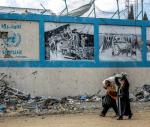You are here
Vaccination drive draws mixed reactions
By Maria Weldali - Jan 11,2021 - Last updated at Jan 12,2021
AMMAN — With the COVID-19 vaccines rolling out in Jordan, the public’s acceptance has varied due to their concerns about the inoculations’ safety and effectiveness.
During a press briefing at the Prime Ministry on Sunday, Health Minister Nathir Obeidat said that the amounts of contracted COVID-19 vaccines are enough to cover 20 per cent of Jordan’s population, assuring that there is no ceiling for the amount as long as there is a turnout to take the vaccine.
Jordan on Saturday night received the first batch of the China-UAE Sinopharm vaccine, with the first shots to be given on Wednesday, “in a fair and non-discriminatory manner and will be based on randomness and luck,” according to Obeidat.
The health minister also said that the Pfizer and Sinopharm vaccines are approved by the Jordan Food and Drug Administration (JFDA) for emergency use.
On the same note, Jordan Pharmacists Association President Zaid Kilani told The Jordan Times on Monday that the COVID-19 vaccines have been developed in record time and have undergone all of the three phases of the large-scale clinical trials with rigorous safety measures.
“The JFDA has followed up the testing and the technical and safety profiles, as well as, assessed the raw data and verified the safety and effectiveness of the vaccines Jordan will be using. The JFDA is an internationally recognised institution of proven competence,” Kilani added.
“The COVID-19 vaccine is 100 per cent safe. There is no need to be terrified by it,” Kilani said, noting that vaccines are not cure-alls but rather vaccines work by making the body produce antibodies to fight the disease without being infected, “causing only the usual and minor side effects”.
There has been a growing hesitancy among citizens in the Kingdom about the vaccination programme, whereas a group of people from different ages told The Jordan Times that even though they believe health officials’ statements, wariness persists.
Maria Al Malak, a 29-year-old Jordanian accountant, told The Jordan Times over the phone that she does not want to get vaccinated against the novel coronavirus.
“I know a lot of people who are afraid to take the vaccine, especially because they do not know its side effects,” Malak said.
Noor Shabsough, 25, said that she feels doubly responsible to get vaccinated to keep her family and senior relatives safe, as well as, ease scepticism among people in the Kingdom.
The low propensity of most people to get vaccinated is because of “all of the big headlines regarding the side effects of the vaccines and its direct link with death”, sociologist Hussein Khozahe told The Jordan Times on Monday.
According to a study issued by the Centre for Strategic Studies at the University of Jordan, 22 per cent of Jordanians believe that the pandemic is nothing but a “conspiracy”, therefore they are less likely to follow the government’s recommendations and public health guidelines.
People’s trust in the vaccine also remains on shaky grounds due to the many contradictions at the official level since the crisis began, Khozahe added, noting that 80 per cent of the public “do not trust state narratives”.
“A sizeable population in Jordan believes that the pandemic has no dire consequences and keeps denying its seriousness,” he added.
Multiple attempts by The Jordan Times to reach the Director of Prince Hamzah Hospital Majed Nuseir for comment were unsuccessful.
Related Articles
AMMAN — The Jordan Food and Drug Administration (JFDA) said on Monday that the administration approved the emergency use of the Johnson &
AMMAN — The Jordan Food and Drug Administration (JFDA) on Wednesday announced that Russia’s Sputnik COVID-19 vaccine was approved for emerge
AMMAN — The AstraZeneca vaccine showed efficacy in reducing hospital admissions and COVID-19 fatalities, the Jordan Food and Drug Administra

















